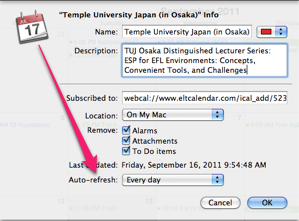Fukuoka JALT:
�(1) Finding What It Takes: Eliciting Answers In University English Classes; (2) Creating Individual Feedback Printouts Using Spreadsheet Software
Date: Saturday, March 10th, 2018 Time: 6:00 PM - 8:00 PM
Speaker: (1) Steve Paton; (2) William Pellowe
Description:
(1) Finding What It Takes: Eliciting Answers In University English Classes
Trainees on the Cambridge CELTA course are taught to elicit answers and responses from students throughout lessons. Doing so is part of an effective, communicative, student-centered class style in which prior knowledge and collaboratively-arrived at answers are integral...but what if your students routinely shut down or panic when you call upon them? Simple, routine requests for verbal responses can often be met with interminable silences which derail the communicative pedagogy and frustrate and confuse both teachers and learners (Seiko, 2011).
Intercultural communication literature confirms that there are significant cultural expectations and propensities that need to be respectfully understood and overcome before our classrooms can become authentically communicative spaces (Banks, 2016; Hofstede, Hofstede, and Minkov, 2010). Among the factors at play are culture-based understandings of 'power-distance' between teachers and learners, the value placed on the collective versus rather than the individual, and the motivation towards 'uncertainty avoidance'.
I'll go over some effective strategies I have developed to help students come to feel comfortable enough interacting in the classroom that they can begin to avail themselves of the benefits of communicative language teaching. These include strategically raising students' consciousness regarding impediments to classroom communication, carrying out a carefully-programmed 'practice and disarming' stage early in a semester, and judiciously applying impactful negative feedback if unwillingness to communicate remains a problem.
(2) Creating Individual Feedback Printouts Using Spreadsheet Software
Teachers doing continuing assessment (CA) collect scores, data, and quantified impressions of students each class, and provide feedback to students regularly. However, increasing concerns at the institutional level about student privacy has led to strict policies being enacted at many institutions. Regardless, students in CA-driven courses need to be kept informed. Since posting student identification alongside performance information is now ill-advised, one viable option is to hand out personalized reports to each student about their ongoing assessment. This daunting task is actually easy if your continued assessment is being recorded into a spreadsheet (like Excel). Come learn how to do this.
About the presenters:
Steve Paton (M.Ed, Apple Distinguished Educator) taught English for several years in Sydney, Australia before coming to Fukuoka in 2008.
William Pellowe (MA TEFL) is an Associate Professor at Kindai University's campus in Iizuka City, Fukuoka. He has been teaching English in Japan since 1990.
Organization: Fukuoka Chapter of the Japan Association for Language Teaching (Fukuoka JALT)
Cost: JALT Members: free
Non-members: 1,000 yen
Venue: Tenjin, Fukuoka City: Kurume University Satellite Campus (ELGALA building, next to Daimaru, near Tenjin Minami station, room 601-2 map
Location: Fukuoka City, Fukuoka Prefecture, Japan
![]() Add this to iCal
Add this to iCal
![]() (Need help?)
(Need help?)
![]() Add to Outlook
Add to Outlook
![]() (Need help?)
(Need help?)
You can add this event to your iCal calendar.
- Click on the iCal icon. Your iCal software will start.
- Click 'Subscribe':

- Under 'Auto Refresh', select 'Every day' in case the the basic details change:

You can add this event to your Microsoft Outlook calendar.
- Click on the MS Outlook icon.
- See what happens.
- Tell us what happens. I don't have MS Outlook on a Windows computer, so I can't test it.
- If you click on the icon and nothing happens, do this:
- Right-click on the icon and save the file.
- According to Microsoft's support page, in Outlook's File menu, you should click Import and Export.
- Click to select Import an iCalendar or vCalendar file (*.vcs), and then click Next.
- Click to select the vCalendar file you've just saved, and then click Open.
Contact Fukuoka JALT
Website: www.fukuokajalt.org
Email QR Code:





